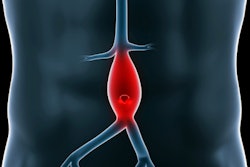
Ultrasound screening for abdominal aortic aneurysms (AAA) may see an uptick in Canada following new guidelines published September 11 by the Canadian Task Force on Preventive Health Care (CTFPHC). For the first time, the task force is recommending ultrasound screening, advising a one-time exam for men ages 65 to 80.
Swayed by clinical trials performed since its previous screening guideline was released 26 years ago, the CTFPHC abandoned its earlier conclusion that there was insufficient evidence to recommend for or against screening. The task force also recommended against screening women for AAA.
"Based on the systematic review of the evidence, the task force has revised its recommendation on screening for AAA since its last review in 1991," the group wrote in the guideline published September 11 in the Canadian Medical Association Journal. "Pooled results of four population-based [randomized controlled trials] provide evidence that screening men aged 65 to 80 years has a sufficiently positive impact on reducing mortality, rupture, and emergency procedures, which outweighs the risk of identification and unnecessary elective procedures of AAA that might never have ruptured."
AAA is diagnosed in an estimated 20,000 people each year in Canada and causes approximately 1,244 deaths, according to the task force.
Broader guidelines
Notably, the new CTFPHC recommendations are broader than other national and international guidelines for AAA screening. For example, the Canadian Society for Vascular Surgery recommends screening men ages 65 to 75. Meanwhile, the current U.S. Preventive Services Task Force (USPSTF) AAA screening guidelines recommend screening men ages 65 to 75 who have ever smoked, along with selective screening for those in that age group who have never smoked. The USPSTF announced in August that it plans to reassess ultrasound screening, however.
"Despite evidence showing increased risk of AAA among smokers, the task force did not make a separate recommendation on screening this population, because there is no evidence on outcomes of screening smokers for AAA," the CTFPHC wrote.
Citing "moderate quality of evidence," the task force considered one-time ultrasound screening for men ages 65 to 80 to be a "weak recommendation."
"The recommendation is weak (despite low variability in patient preferences for men of this age), because of uncertainty regarding the impact of declining rates of AAA, which reduces confidence in the degree of the benefit from screening," the task force wrote.
The weak recommendation in favor of screening also highlights the need for shared decision-making with patients.
The task force also said that its guidance on not screening men older than 80 was a "weak recommendation" due to "low quality of evidence."
"The recommendation is weak, because uncertainty remains owing to the low quality of evidence on the size of the effect of screening men older than 80 years," the group wrote. "A weak recommendation suggests primary care providers should discuss patient preferences regarding screening with healthy men older than 80 years of age for whom an elective procedure to repair an AAA would pose less risk."
No screening for women
Not screening women for AAA was considered by the task force to be a "strong recommendation" due to a "very low quality of evidence."
"The recommendation is strong, as risk of developing an AAA is much lower for women, but AAA screening would harm some women and consume resources that could otherwise be used for interventions with demonstrated effectiveness," the task force wrote.
The group said that further research is needed to assess whether screening can improve outcomes in population subgroups such as those who have ever smoked and adults with a family history of AAA. In addition, the task force would like to see research exploring the value of rescreening all patients or rescreening specific sets within the population, such as by race or ethnicity.
"Future studies should also monitor the epidemiology of AAA as age-based screening may have less of a positive impact if the prevalence of AAA continues to decline in the general population," the group wrote. "Ultimately, a more targeted approach to screening could be required."




















